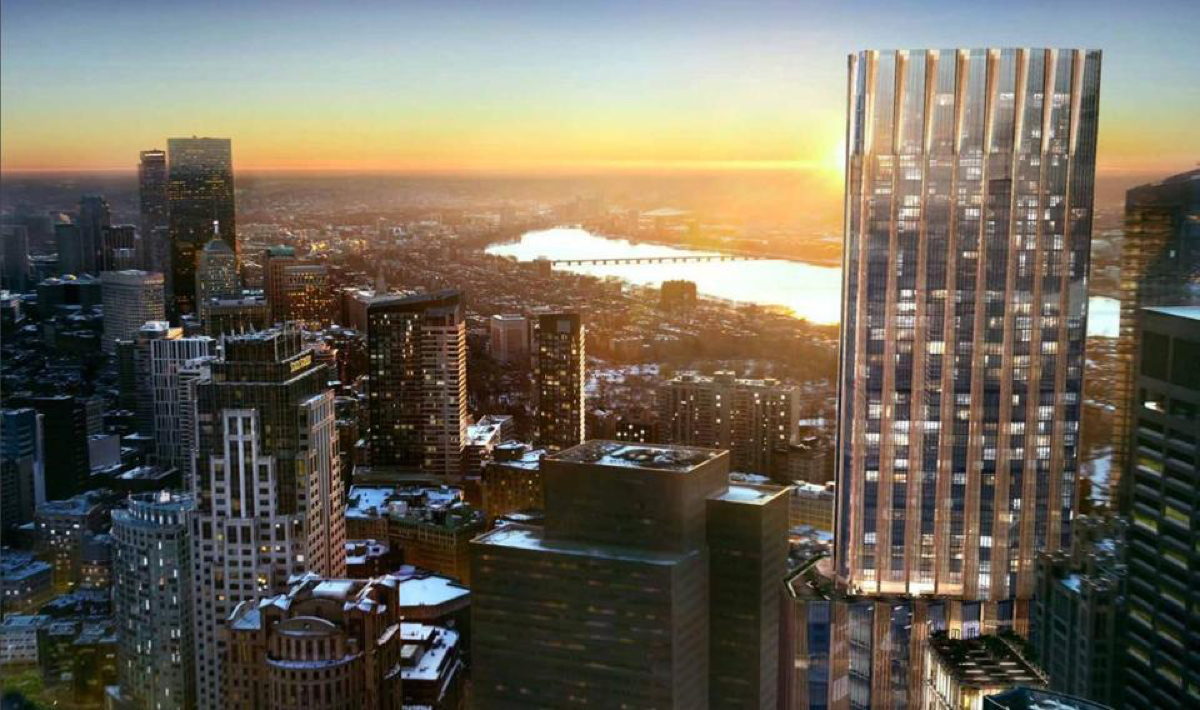Divisions Deepen over the Winthrop Square Tower’s Shadows

As critical votes loom on the future of a tower in Winthrop Square that would darken part of Boston’s two best-known parks, divisions on Boston’s most consequential development have deepened.
The City Council, the Legislature, and the governor will each need to sign off on the project, which requires a waiver to a decades-old law that bans new shadows on both Boston Common and the Public Garden. A proposed 775-foot tower on the city-owned plot would do just that in the morning for part of the year. The Walsh administration and the Boston Planning and Development Agency have both pushed for it, stressed that it would convert a useless parking garage into millions for parks and affordable housing, and recently unveiled a new deal that would ban new shadows elsewhere in the city as part of a broader compromise.
Joining the fray today ahead of a hearing on the topic were both Boston City Council President Michelle Wu and former Massachusetts Gov. Mike Dukakis, who co-wrote an op-Ed in the Boston Globe vigorously opposing the project and how it came to be, warning that allowing an exemption to the law sets a dangerous precedent, and calling on officials to start discussions over the project from scratch:
Over the last 50 years, advocates and legislators have come together to protect not just the open space but also the sunshine on the Common. In the 1970s, intensive negotiations over the Park Plaza Development brought the acceptable height of buildings close to the Common and Public Garden from a proposed 215 feet down to 90 precisely to keep them out of shadows. Years later, citizens codified what they determined to be an acceptable balance of development and preservation of sunlight with the 1990 state shadow law.
We should be more deliberate when reconsidering their wisdom, and not blinded by a one-time, multimillion dollar payout.
The Boston Planning and Development Authority’s process to select a developer willfully ignored that state law in an attempt to maximize profit for the city. Government budgets are perpetually tight and municipal leaders are perennially called on to find the money. But we must not run government as a soulless corporation. Our parks are not profit centers.
This is hardly the first ink to be spilled on the issue. In fact, amid a historic building boom (and an impending election) it’s become one of the most-written-about topics in Boston.
City Councilor Tito Jackson, who is running for mayor, has opposed the project, penning a column of his own for the Boston Sun in January, in which he opined: “Millennium Partners’ proposed tower on the downtown Winthrop Square property would overshadow – figuratively and literally – the treasured heart of our downtown.” He tweeted an endorsement of the Wu/Dukakis piece Monday morning.
Globe columnist Adrian Walker has endorsed the project, calling the neighborhood groups and park advocates who have pushed back against it “well-meaning but deeply misguided.” Said Dante Ramos, about the whole thing, “There just isn’t a problem here.”
Shirley Leung, another influential Globe scribe, weighed in to criticize the way the city kicked the can down the road for too long on whether to allow an exemption to the law, leading to an eleventh hour fight over a long overdue redevelopment and putting other projects at risk. And Renée Loth called the discussion more of “the sort of one-off negotiation that candidate Walsh said he wanted to end.”
The Boston Herald ‘s editorial board also threw its support behind the skyscraper today, citing in part the “enormous” benefits of the cash infusion it would bring to the city’s coffers.
A hearing is scheduled for today at 1:30 p.m. in City Hall.


